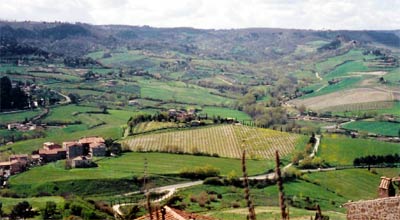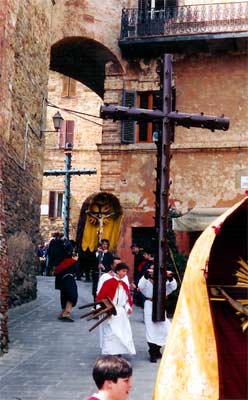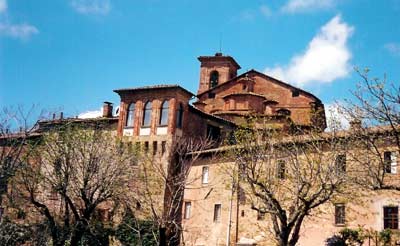Easter in Umbria
When my husband and I planned a month-long trip to Italy last Spring, we realized that Easter would fall during our stay. Although we had visited Italy numerous times before, we had never been there for a major holiday. The prospect of spending the Easter holidays in a country that is so steeped in religious tradition was both exciting and a little intimidating. Expecting that places would likely be crowded during a popular vacation period, we carefully planned our itinerary so we?d be situated somewhere off the beaten track during Le Festa di Pasque, Holy Week.
 With some on-line research, I located a vacation apartment in Panicale, a tiny hilltop town in the heart of Umbria, in central Italy. It is situated a short distance off the main route from Rome to Florence, reasonably close to several places we were eager to visit, such as Cortona and Assisi. As with most vacation homes, the rental was weekly, beginning on Saturday, and so our stay there would begin the day before Easter Sunday. We wanted to be settled in somewhere nearby for Holy Thursday and Good Friday and chose to spend those days in one of our favorite Umbrian towns, Orvieto. We booked two nights in a B&B located in a palace on the edge of town.
With some on-line research, I located a vacation apartment in Panicale, a tiny hilltop town in the heart of Umbria, in central Italy. It is situated a short distance off the main route from Rome to Florence, reasonably close to several places we were eager to visit, such as Cortona and Assisi. As with most vacation homes, the rental was weekly, beginning on Saturday, and so our stay there would begin the day before Easter Sunday. We wanted to be settled in somewhere nearby for Holy Thursday and Good Friday and chose to spend those days in one of our favorite Umbrian towns, Orvieto. We booked two nights in a B&B located in a palace on the edge of town.
Upon our arrival in Orvieto, we were pleased to learn that our room there was actually a self-catering apartment. Our hostess, Valeria, lived alone in the grand palace owned by her family for several hundred years. She offered breakfast to her guests, relishing the opportunity to visit with them. She showed us the impressive antique filled rooms of the main building, their vaulted ceilings and walls covered in elaborate frescoes, then led us to our comfortable apartment in a separate wing. We had a private terrace with a vista of tiled rooftops just below us, and the countryside in the distance. We ate dinner there that night, after shopping like the locals in the town's markets.
The following day was Good Friday, a day that would culminate with a candlelight procession through town depicting the passion of Christ. The normally bustling town was even more crowded on this holiday. We joined the throngs in the streets, and were carried along to the main square at the town?s pinnacle, site of Orvieto?s extraordinary Duomo with its remarkable facade of colorful mosaics and intricate carvings. We reacquainted ourselves with many of the towns? other notable medieval churches and buildings. I climbed to the top of the 150 foot high clocktower, Torre de Moro, partly for the fabulous view, but more to alleviate any guilt I felt about indulging in gelato that afternoon. We had looked forward to the evening?s pageantry, but unfortunately pouring rain forced its cancellation.
On Saturday, after enjoying Valeria?s marvelous breakfast, we set off to Panicale, our home for the coming week. Since it was not far, we took a leisurely route through the Umbrian hills. In the early spring, the land was lushly green. The farms dominating the landscape looked rather affluent and we surmised that farming was quite lucrative in this part of the country. In the late morning, we arrived outside the walls of Panicale, high on a hill of olive groves and vineyards overlooking Lake Trasimeno, one of the larger lakes in Italy. The landlord of our rental was the owner of the town?s bar, which served as the unofficial social center. We had been told there would be no trouble finding him, and as soon as we entered the main square, we spotted him standing outside the bar. He offered us cappucinos while he found someone to show us to our apartment. Sipping our coffees at a table outside, we watched a group of young boys playing a boisterous game of street soccer in the tiny square until an errant kick of the ball shattered a terracotta flower pot, and suddenly the boys vanished.
Panicale, a perfectly restored medieval town, consists of two steep streets which circle inside the town's walls, beginning and ending in the main square. A third street climbs up the middle of the town, terminating at its peak, the location of the Palazzo del Podesta, the original palace around which this fortified town was built. Our apartment was named "Podesta", which naturally meant it was located at the top of this same street, one that was inaccessible by car. Climbing the sharply inclined street, we were soon out of breath and realized we would certainly get plenty of exercise during our stay.
 The apartment was clean and modern, with a balcony offering superb views. Below the balcony was a charming garden where a neighbor was tending his plants. He looked up and said, "Hi." I was surprised at the American greeting, and said, "Hi," in return. He asked if I was American, and I soon learned that he was one also, now making his home in Panicale. He gave me some background on the town, which has only about 50 permanent residents, mostly elderly. The majority of homes are now owned by foreigners or Romans as their country retreats. This was his first Easter in town, and he remarked that he had never seen it so crowded. The holiday festivities were to include a Sunday morning procession through town with 20-foot crosses. On Monday, which was also a holiday, there would be "cheese games", about which he was not certain, but was apparently a rowdy team contest which involved rolling wheels of parmesan cheese through the streets. We could hardly wait to see, but knowing what we pay for good Parmesan cheese in the states, we couldn't imagine using it this way. My new American acquaintance also recommended that if we intended to dine out during the next few days, we should quickly make reservations, since there were only a couple of local restaurants and a lot of people in town for the weekend. We thought that was sound advice, and set out to familiarize ourselves with this unique town.
The apartment was clean and modern, with a balcony offering superb views. Below the balcony was a charming garden where a neighbor was tending his plants. He looked up and said, "Hi." I was surprised at the American greeting, and said, "Hi," in return. He asked if I was American, and I soon learned that he was one also, now making his home in Panicale. He gave me some background on the town, which has only about 50 permanent residents, mostly elderly. The majority of homes are now owned by foreigners or Romans as their country retreats. This was his first Easter in town, and he remarked that he had never seen it so crowded. The holiday festivities were to include a Sunday morning procession through town with 20-foot crosses. On Monday, which was also a holiday, there would be "cheese games", about which he was not certain, but was apparently a rowdy team contest which involved rolling wheels of parmesan cheese through the streets. We could hardly wait to see, but knowing what we pay for good Parmesan cheese in the states, we couldn't imagine using it this way. My new American acquaintance also recommended that if we intended to dine out during the next few days, we should quickly make reservations, since there were only a couple of local restaurants and a lot of people in town for the weekend. We thought that was sound advice, and set out to familiarize ourselves with this unique town.
Within 10 minutes, we had pretty much covered the town on foot, locating 2 bars, 3 grocers, and 3 restaurants, along with a couple of other shops, some featuring the local olive oil and wine for which this area is noted. We made dinner reservations at the most promising of the restaurants, then bought some groceries, planning to cook our own Easter meal. Making the evening's reservation was fortunate, since when we left the restaurant late that night, there were still many people waiting for tables.
 On Sunday morning, our landlord treated us to some traditional Easter bread and prosciutto, and then we sat in the middle of the square to watch the solemn procession. Huge crosses emerged from the church, each carried down the steep street by a single male. It seemed an incredible feat, but we were told it is a big honor to be a cross-bearer. Once the procession passed us, the crowd scattered and we returned to our apartment. Sitting out on our balcony, we heard the sounds of families enjoying their holiday dinners all around us, their voices echoing off the town walls.
On Sunday morning, our landlord treated us to some traditional Easter bread and prosciutto, and then we sat in the middle of the square to watch the solemn procession. Huge crosses emerged from the church, each carried down the steep street by a single male. It seemed an incredible feat, but we were told it is a big honor to be a cross-bearer. Once the procession passed us, the crowd scattered and we returned to our apartment. Sitting out on our balcony, we heard the sounds of families enjoying their holiday dinners all around us, their voices echoing off the town walls.
We awoke on Monday to an unfortunate situation: it was pouring rain and we both had head colds. I ventured out to the grocers for tea and lemons, and we spent the day curled up on the sofa watching American situation comedies with dubbed-in Italian on TV. The cheese games were cancelled due to the weather. We were not destined to find out exactly how they are played, but we were fortunate that they were not held. We had assumed the cheeses would be rolled around the circular streets within the town's walls, but the next day on the windshield of our car which had been parked outside the walls, we found a note which, loosely translated, told us our car was in danger of being damaged by cheeses. Imagine trying to explain that to the rental company!
The rest of our week was spent visiting many of the neighboring towns, which each had a special attraction. We viewed the renowned frescoes depicting the life of St. Francis in Assisi; watched pottery being intricately hand-painted in Deruta; visited the wine museum in Torgiano. Even little Panicale has its tourist attraction: a famous fresco by XVI century artist Pietro Vannucci adorns its Church of St. Sebastian. Each evening we returned to the square at the top of the town to watch the sun set over the distant lake.
The week quickly drew to an end. We sadly said our farewells to several of the townspeople who we had come to know during our stay. Although the weather had interfered with most of the holiday?s special events, we have no doubt that as we celebrate future Easters, our thoughts will return to this particular one, spent in the hills of Umbria.
